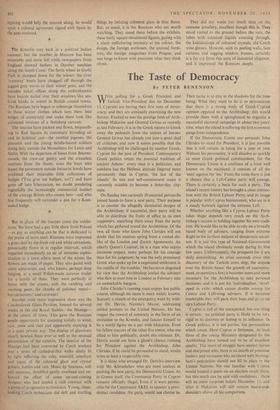The Taste of Democracy
)3y PETER BENENSON WITH polling for a Greek President and Turkish Vice-President ,due on December 13, Cypriots are having their first taste of demo- cracy; and they are anxiously examining the new flavour. Exalted as was the prestige both of Arch- bishop Makarios and General Grivas as recently as last February, it is in the Greek nature to knock away the pedestals from the statues of heroes. General Grivas has already run into a great deal of criticism; and now it seems possible that the Archbishop will be challenged by another Greek- Cypriot for the post of President. Contemporary Greek politics retain the essential tradition of ancient Athens : every man is a politician, and nowhere has the Hellenic attitude lingered more persistently than in Cyprus, 'the last of the islands.' Its size and self-containment make it curiously suitable to become a latter-day city- state.
On Sunday two curiously ill-assorted patriarchs joined hands to form a new party. Their purpose is to counter the allegedly dictatorial designs of the Archbishop; if successful, their party will be able to distribute the fruits of office to its own supporters, snatching them away from the party which has gathered round the Archbishop. Of the two, all those who know john Clerides will not doubt that his motives spring from a rooted dis- like of the London and Zurich Agreements. An elderly Queen's Counsel;' he is a man who enjoys immense respect, more perhaps for his courage than for his judgment; he was the only prominent Greek who spoke up for a negotiated settlement in the middle of 'the troubles.' He has never disguised his view that the Archbishop jostled the advisers who flew to meet him in London in February into an unworkable bargain.
John Clerides's running mate enjoys less public esteem, although his name is more widely known. Scarcely a month of the emergency went by with- out Dr. Dervis, Nicosia's Mayor, addressing cabled protests to the United Nations. He has reaped the reward of notoriety in the 'form of an invitation to the Kremlin, and fancies himself to be a world figure on a par with Makarios. Even his fellow mayors of the other five towns, who are allied to him politically, doubt this estimate. Dr. Dervis would not have a ghost's chance running for President against the Archbishop. John Clerides, if he could be persuaded to stand, would score at least a respectable vote.
It is those who arranged Dr. Dervis's interview with Mr. Khrushchev who are most zealous in pushing the new party, the Democratic Union. As in Greece itself, the Communist Party in Cyprus remains officially illegal. Even if it were permis- sible for the Communist AKEL to sponsor a presi- dential candidate, the party would not choose to. Their tactic is to stay in the shadows for the time being. What they want to do is to demonstrate that there is a strong body of Greek-Cypriot opinion opposed to the Archbishop; this would provide them with a springboard to. organise a successful electoral campaign in about two years' time, when the island is suffering the first economic pangs from independence.
If the Democratic Union can persuade John Pericles to stand for President, it is just possible that it will remain in being fOr a year or two. Without his personality, it will dissolve as quickly as most Greek, political combinations, for the Democratic Union is a coalition of a kind well known on the mainland; it consists of all the `outs' against the 'ins.' From the ruins there is just a chance that a Left-Centre party will emerge. There is certainly a basis for such a party. The island's recent history has brought a close connec- tion with the British Labour Party, and its image is popular with Cyprus businessmen, who see in it a steady bulwark against the extreme Left.
Whether anything like a Cyprus Labour Party takes shape depends very much on the Arch- bishop's success in holding together his own coali- tion. He would like to be able to rely on a broadly based body of advisers, ranging from extreme Right to the farthest outpost of democratic social- ism. It is just this type of National.Covernment which the island obviously needs during its first few years. Unfortunately, the prospects for it are daily diminishing. As crisis succeeds crisis (the discovery of the Turkish arms ship; the dispute over the British bases; the growth of unemploy- ment, to mention a few) it becomes more and more necessary for the Archbishop to take personal decisions, and it is, just his 'individualism.' devel- oped in exile, which causes doubts among his Centre and Left-wing advisers. If it becomes intolerable they will pack their bags and go to set up a Labour Party.
Cyprus is full of the unexpected, but one thing is certain : no political party is likely to be very rigid in its doctrine or lasting in its influence. In Greek politics. it is not parties, but personalities which count. Here Cyprus is fortunate. At least three of the young Ministers designated by the Archbishop have turned out to be of excellent quality. The years of struggle have steeled nerves and sharpened wits; there is no dearth of potential leaders, and no reason why an island with Not t ing- ham's population should not fill its place in the United Nations. No one familiar with Cyprus would hazard a guess on an election result there, but this much can be said with confidence : there will be more surprises before December 13. and after it Makarios will still remain beard-and- shoulders above all his compatriots.






































































 Previous page
Previous page